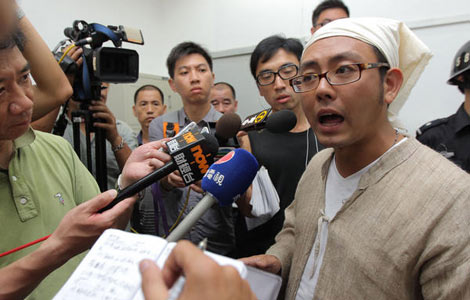Investigation into jobs for leaders' children
Updated: 2011-08-11 07:44
By Cang Wei (China Daily)
|
|||||||||||
BEIJING - A recruitment exam for government-affiliated institutions in Lushan, East China's Jiangxi province, has aroused public anger over possible favoritism and fraud.
Five government leaders' children topped an exam conducted by the Lushan administration bureau to recruit 11 people.
The exam requirements specified the majors and the gender of the candidates, and only those with a Lushan residency permit were eligible to sit the exam.
All the children of local government leaders - more than the five who succeeded in gaining an interview - applied for different positions.
The provincial human resources and social security department has sent a team to Lushan to investigate and they began looking into the recruitment procedure on Wednesday morning.
"It is clearly defined by the province's recruitment regulations that no discriminatory requirements should be made," said a worker from the Lushan administration bureau's department of human resources and social security, who asked to remain anonymous.
"Requirements for majors are reasonable, but those about gender and residency permits are not appropriate," she said. "The recruitment will be canceled if it is proved to be fraudulent, and the people involved will be punished."
"All the five leaders involved should be punished," said a netizen named "sunshine abccba" from Zhejiang province, on China's most popular micro blog website, weibo.com.
"If those leaders don't get punished, such scandals cannot be prevented."
But Zhu Changming, another staff member from the human resources and social security department of the Lushan administration bureau, told Xinhua News Agency earlier the fact that five leaders' children got through to a final interview was "a coincidence".
The face-to-face interview, which is the last stage of the recruitment process, will be broadcast live on television in Lushan so people can see it for themselves, Zhu added.
"I will take full responsibility if any fraud exists in the recruitment procedure," Zhu said.
However, this is not the first time the district has been accused of such activities. In December 2010, many Chinese netizens showed their anger on the Internet after children of local government leaders were assigned well-paid jobs with government-affiliated institutions such as the finance bureau.
There have been a number of recruitment scandals connected with government-affiliated institutions - where the conditions are comparatively good and workers are well paid - across China recently.
Li Fangping, an attorney at Beijing Ruifeng Law Firm, said China should strengthen the law to prevent fraud.
"It was only in 2005 that the country made an interim provision for recruitment by government-affiliated institutions," said Li. "Specific legislation should be introduced to tackle recruitment fraud and to guarantee fairness."
Hot Topics
Anti-Gay, Giant Panda, Subway, High Speed Train, Coal Mine, High Temperature, Rainstorm, Sino-US, Oil Spill, Zhu Min
Editor's Picks

|

|

|

|

|

|







